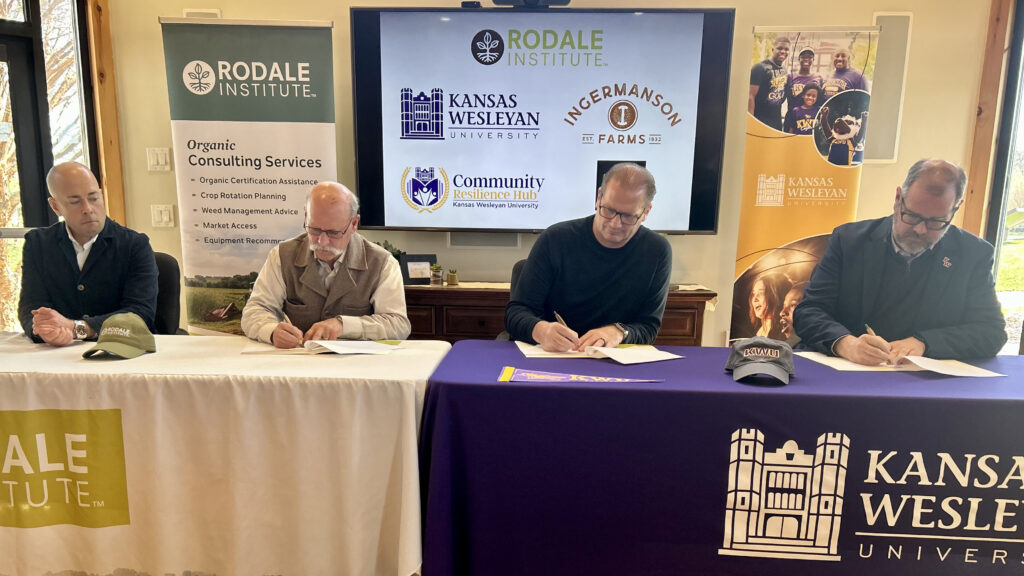Rodale Institute, a global research and education nonprofit, is joining forces with Kansas Wesleyan University and Quail Creek Family Farms (QCFF) to grow education programming in Kansas focused on regenerative organic farming models. Priorities for the organizations include developing an accredited Kansas-based Rodale Institute Farmer Training (RIFT) program, establishing a Rodale Institute Regional Resource Center in Salina, Kansas and exploring potential sites for a local farm-to-institution production facility.
“Rodale Institute is committed to expanding opportunities for the next generation of American farmers and investing in the nation’s farming communities,” said Rodale Institute CEO Jeff Moyer. “Through this joint effort, Rodale Institute, Kansas Wesleyan University and Quail Creek Family Farms will build a pipeline of farmers skilled in regenerative organic agricultural practices and establish a hub for agriculture education and innovation in Kansas.”
“A partnership with a global leader that has a 75-year commitment to regenerative organic agriculture will enable our Community Resilience Hub to provide the highest level of research and programming available in the industry,” said Matt Thompson, Ph.D., president and CEO of Kansas Wesleyan. “We are honored to work alongside Rodale and thrilled to embark on a new and deeper relationship with JRI Hospitality. It is exciting to imagine what our three organizations can do to harness the health and safety of our land, food systems and community.”
“We’re so excited to have Rodale Institute as a partner along with Kansas Wesleyan. Both are leaders in what they do and how they treat the communities they serve,” said QCFF owner, Jason Ingermanson. “When taking over Ingermanson Farms from my dad in 2015, I recognized the direction farming was going and the added importance of how our future food is grown, distributed, and presented to the families that we feed. I’m excited to collaborate and work with other area family farms to introduce the idea of incorporating these practices and becoming a part of our distribution for the betterment of both the farmer and consumer of Kansas farm commodities.”
The Rodale Institute Regional Resource Center in Salina, Kansas will be the Institute’s sixth regional center in the United States. The Institute’s local extensions serve farmers in select geographical areas by conducting practical research on local soil and crops, providing education programming and assisting farmers with regionally significant challenges.
ABOUT RODALE INSTITUTE: Rodale Institute is a 501(c)(3) nonprofit dedicated to growing the regenerative organic agriculture movement through rigorous research, farmer training, and education. The Institute’s groundbreaking science and direct farmer support programs serve as a catalyst for change in farming and food production worldwide. Over its 75-year history, Rodale Institute has proven that organic farming is not only viable but essential to humanity’s survival.
ABOUT THE COMMUNITY RESILIENCE HUB (CRH) AT KANSAS WESLEYAN UNIVERSITY: The Community Resilience Hub at Kansas Wesleyan University is a multifaceted initiative that supports hands-on training and research in regenerative organic farming, food security and community resilience through education, advocacy and action. The university is an integral partner in a three-year USDA Local Food Promotion Program grant with the Kansas Rural Center, Common Ground Producers and Growers, and St. John’s Missionary Baptist Church, focused on creating a 12-county food corridor of local, regenerative, chemical-free food offerings along Interstate135 between Salina and Wichita. Research and education will begin in the coming year on six-hundred acres at Quail Creek Family Farms in Saline County, Kan., managed by the Hub’s collaborative partner, JRI Hospitality. Through collaboration with Rodale Institute and Quail Creek Family Farms, CRH is devoted to training the next generation of regenerative organic farmers through field experience and research through an accredited curriculum. The vision of CRH is to develop partnerships and replicable programs that will lead to more stabilized, secure and equitable food systems in communities in the state and across the nation.
ABOUT KANSAS WESLEYAN UNIVERSITY: Kansas Wesleyan University is a private, nonprofit, four-year college in Salina, Kan., and affiliated with the United Methodist Church. Its mission is to promote and integrate academic excellence, spiritual development, personal well-being and social responsibility. KWU provides an educational program characterized by excellence, within a caring community, rooted in the liberal arts tradition, that includes 16 academic departments and a wide range of majors. More than 98 percent of graduates from the past three years are in jobs or graduate school within six months of graduation. KWU’s music program and debate teams have been especially successful, with debaters winning more than 65 national championships and graduates of the music program securing positions all over the U.S. Multiple athletic teams have advanced to national tournaments in recent years, and last year, the athletic department’s cumulative GPA was greater than 3.0. For more information, visit www.kwu.edu.
ABOUT QUAIL CREEK FAMILY FARMS (QCFF): JRI Hospitality and Ingermanson Farms are on a journey to create a fully functioning regenerative farming operation and education program with the launch of Quail Creek Family Farms in Salina, Kansas. The intent is to educate, connect and support local Midwest communities in regenerative organic agriculture to meet demands of feeding families. In its regenerative-farming quest, Quail Creek Family Farms has given Kansas Wesleyan University, an institution JRI Hospitality has partnered with in other endeavors, the opportunity to take advantage of the concept. The mutual goal is to create a collaborative effort bringing together a higher education certification for KWU students and additional future farming opportunities to those certified students.
Ingermanson Farms initially is transitioning 1,000 acres of its nearly 5,000 acres into Quail Creek Family Farms and the farmland will serve as the first area to be developed, and certified “Regenerative Organic.” The first 300 acres has been planted to cover crop. Currently, 145 sheep are rotational grazing on the acreage. With the additional acreage, the farm will construct several mobile chicken coops, and will begin to introduce several other animals and crops into the system. For more information, visit www.jriusa.com, www.ingermansonfarms.com and www.quailcreekfamilyfarms.com.



